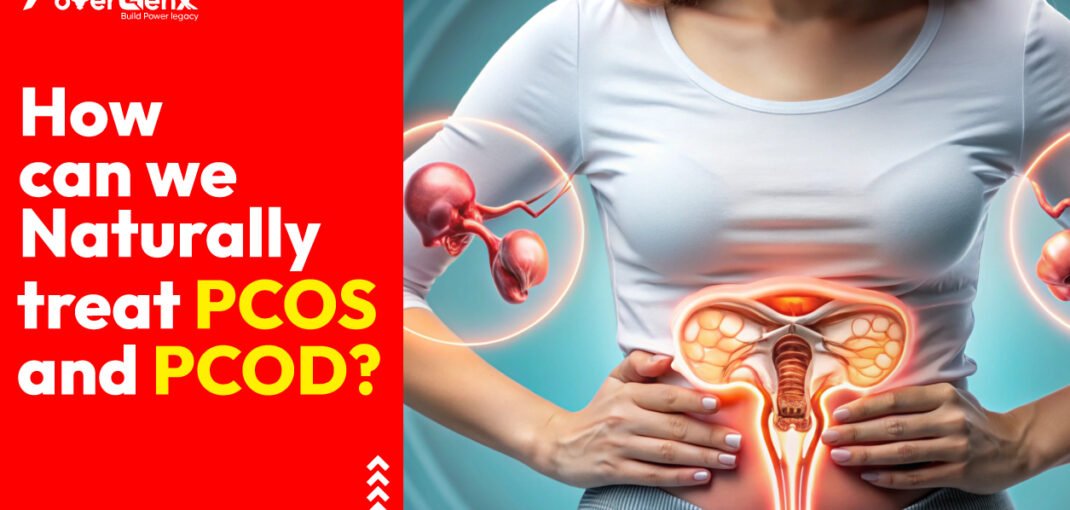Polycystic Ovary Syndrome (PCOS) and Polycystic Ovary Disease (PCOD) are two of the most common hormonal disorders affecting women of reproductive age. These conditions involve irregular menstrual cycles, and cysts on the ovaries, and can lead to issues like infertility, weight gain, acne, and excessive hair growth. While modern medicine provides treatments to manage these conditions, many wonder if it’s possible to cure PCOS and PCOD naturally. Let’s explore natural ways to manage and potentially improve these conditions, though it’s essential to note that a “cure” might not always be possible.
Understanding PCOS and PCOD
Before diving into natural remedies, it’s crucial to understand the root cause. PCOS and PCOD are largely hormonal imbalances, often linked to insulin resistance, inflammation, and lifestyle factors. While genetics can play a role, these conditions are often exacerbated by poor diet, lack of physical activity, and chronic stress. Hence, focusing on natural interventions to address these underlying issues can make a significant difference.
1. Dietary Changes: A Foundation for Healing
Diet is one of the most impactful areas where changes can help manage PCOS and PCOD symptoms.
Focus on Whole Foods: Whole foods, including fresh fruits, vegetables, whole grains, and lean proteins, are vital in balancing hormones. Avoiding processed and sugary foods can reduce insulin spikes and inflammation.
Balanced Blood Sugar: Since insulin resistance is a key factor in PCOS and PCOD, regulating blood sugar is crucial. Opt for low-glycemic-index foods such as quinoa, lentils, and leafy greens to keep insulin levels in check.
Healthy Fats: Omega-3 fatty acids, found in foods like flaxseeds, walnuts, and fatty fish, can reduce inflammation and balance hormones. These fats also improve overall health and support reproductive function.
Herbal Support: Some herbs like cinnamon, fenugreek, and spearmint are known to help with blood sugar control and hormone balance. For example, spearmint tea has been shown to reduce androgen levels, which are often elevated in women with PCOS.
2. Exercise: Regulating Hormones and Reducing Stress
Regular physical activity can have a profound impact on managing PCOS and PCOD symptoms. Exercise helps improve insulin sensitivity, aids in weight management, and reduces inflammation, all crucial factors in balancing hormones.
Strength Training: Weight lifting or resistance exercises can increase muscle mass, which improves insulin sensitivity and helps burn fat more effectively.
Aerobic Exercises: Activities like walking, cycling, or swimming are great for cardiovascular health and help regulate menstrual cycles by stabilizing hormone levels.
Consistency is Key: It’s not about how intense your workouts are, but how consistent you are. Even moderate exercise, when done regularly, can reduce symptoms over time.
3. Managing Stress: A Silent Contributor
Stress plays a significant role in hormonal imbalances. Chronic stress triggers the release of cortisol, which can worsen insulin resistance and increase inflammation, making PCOS and PCOD symptoms worse.
Mindfulness and Meditation: Practicing mindfulness techniques, such as yoga, deep breathing exercises, or meditation, can help reduce cortisol levels and promote a sense of calm.
4. Herbal and Natural Supplements
Several natural supplements may aid in managing PCOS and PCOD symptoms. While they shouldn’t replace medical treatments, they can complement other natural approaches.
Inositol: This natural compound, often found in the form of Myo-inositol and D-chiro-inositol, has been shown to improve insulin sensitivity and regulate menstrual cycles in women with PCOS.
Vitamin D: Many women with PCOS are deficient in vitamin D, which can affect insulin sensitivity and hormone balance. A vitamin D supplement, along with adequate sunlight exposure, may help improve symptoms.
Magnesium: Magnesium is essential for reducing insulin resistance and calming the nervous system. It can also improve sleep quality and reduce stress levels.
5. Acupuncture and Traditional Therapies
Acupuncture, a practice rooted in traditional Chinese medicine, has been used to treat hormonal imbalances, including those seen in PCOS and PCOD. It involves inserting thin needles into specific points on the body to regulate energy flow and stimulate healing.
Improving Blood Flow: Acupuncture may improve blood flow to the ovaries, which can enhance their function and help regulate the menstrual cycle.
Reducing Stress: Acupuncture has been shown to reduce stress levels and improve the body’s ability to cope with hormonal imbalances.
6. Maintaining a Healthy Weight
While weight loss is not the sole solution to PCOS, maintaining a healthy weight can significantly improve symptoms. Even a small reduction in weight can lead to better hormonal balance and more regular menstrual cycles.
Gradual, Sustainable Weight Loss: Avoid extreme diets or drastic weight loss methods. Instead, focus on long-term, sustainable changes like portion control, mindful eating, and regular physical activity.
7. The Importance of a Support System
Managing PCOS or PCOD can be challenging, but having a strong support system can make a big difference. Connect with others going through similar experiences, whether through online forums, support groups, or close friends and family. Emotional support can help reduce stress and keep you motivated on your journey toward better health.
Final Thoughts: Can We Cure PCOS and PCOD Naturally?
While there is no definitive cure for PCOS or PCOD, many women have successfully managed their symptoms and even reversed some aspects of these conditions through natural methods. By focusing on a healthy diet, regular exercise, stress management, and the right supplements, you can create an environment where your body can heal and balance itself.
However, it’s essential to consult with a healthcare provider before making any significant changes, especially if you are already receiving medical treatment. Each individual’s experience with PCOS or PCOD is unique, and a holistic approach that combines natural methods with medical care might offer the best results.






